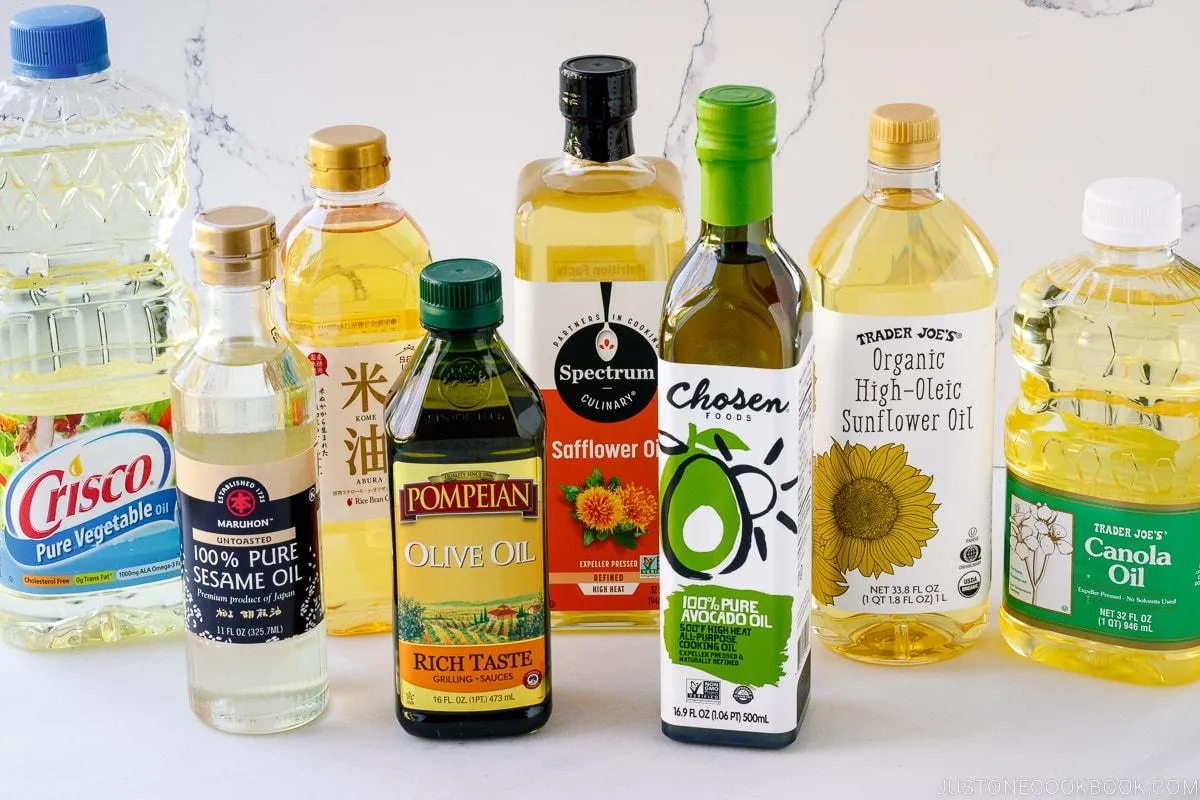
Cooking Oil Showdown
There are various types of cooking oils, each with its unique characteristics and best uses in cooking. Here are some examples of different cooking oils and how they perform best under various conditions:
Olive Oil:
Extra Virgin Olive Oil: Known for its fruity flavor and low smoke point, extra virgin olive oil is best used for drizzling over salads, dipping bread, or lightly sautéing at low to medium heat.
Regular Olive Oil: Has a higher smoke point than extra virgin olive oil, making it suitable for sautéing, roasting, and frying at medium temperatures.
Canola Oil:
Canola oil has a high smoke point and a neutral flavor, making it a versatile choice for frying, baking, and sautéing.
Vegetable Oil:
Vegetable oil is a blend of various oils and is also suitable for frying, baking, and sautéing due to its high smoke point and neutral flavor.
Coconut Oil:
Coconut oil has a distinct coconut flavor and a relatively high smoke point. It is commonly used in baking, stir-frying, and sautéing, as well as in recipes where the coconut flavor is desired.
Peanut Oil:
Peanut oil has a high smoke point and a mild flavor, making it ideal for deep frying, stir-frying, and sautéing. It's often used in Asian cuisine.
Sesame Oil:
Sesame oil comes in two varieties: light and dark. Light sesame oil has a higher smoke point and is good for frying and stir-frying. Dark sesame oil is used as a flavoring agent in Asian dishes.
Avocado Oil:
Avocado oil has a high smoke point and a mild, buttery flavor. It's suitable for roasting, grilling, and sautéing, as well as for making salad dressings.
Grapeseed Oil:
Grapeseed oil has a high smoke point and a neutral flavor, making it versatile for frying, sautéing, and baking.
Sunflower Oil:
Sunflower oil has a high smoke point and is commonly used in deep frying, baking, and cooking at high temperatures.
Flaxseed Oil:
Flaxseed oil has a low smoke point and should not be heated. Instead, it's best used as a finishing oil for drizzling over salads or dishes for added flavor and omega-3 fatty acids.
Corn Oil:
Corn oil has a high smoke point and is suitable for frying, baking, and general cooking.
The choice of cooking oil depends on the cooking method and the flavor you want to impart to your dishes. It's essential to consider the smoke point of the oil when selecting the right one for a particular cooking technique. High smoke point oils are better for high-heat cooking methods like frying, while low smoke point oils are better for low-heat methods or as finishing oils. Additionally, the flavor of the oil should complement the dish you're preparing.
See What Our Clients Have to Say

Call Us for Any Questions
Please do not hesitate to reach out via call, text or email!
Phone: (404) 557-0201
Email: Josh@jhintoncapitol.com
Office:
PO Box 449, Jefferson, GA 30549
Call
404-557-0201
Email:
josh@jhintoncapital.com
Facebook:
facebook.com/jhintoncapital
This site provides term life insurance quotes. Each rate shown is a quote based on information provided by the carrier. By requesting a quote, you agree to the J Hinton Capital Services Privacy Policy. By submitting your personal information, you are making a consumer inquiry for life insurance by licensed insurance advisors. You consent to be contacted by a licensed advisor via phone or email. J Hinton Capital Services will not sell your information to a third party. Any health or personal information shared is protected by applicable HIPAA privacy laws and regulations. Invitation for application for life insurance on jhintoncapital.com are made through its designated agent, Josh Hinton. Commercial use by others is prohibited by law. No portion of jhintoncapital.com may be copied, published, faxed, mailed or distributed in any manner for any purpose without prior written authorization from the owner. Rates and time taken to qualify and purchase a life insurance policy vary by product and underwriting requirements.
© 2022 Copyright. All rights reserved.
Privacy Policy - Terms and Conditions
